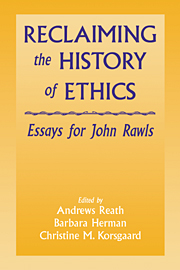Book contents
- Frontmatter
- Contents
- List of Contributors
- Introduction
- Aristotle on the Soul's Conflicts: Toward an Understanding of Virtue Ethics
- Coercion, Ideology, and Education in Hobbes's Leviathan
- The Hobbesian Side of Hume
- The Natural Goodness of Humanity
- Metaphysics, Philosophy: Rousseau on the Problem of Evil
- Within the Limits of Reason
- A Cosmopolitan Kingdom of Ends
- Legislating for a Realm of Ends: The Social Dimension of Autonomy
- Kant on the Objectivity of the Moral Law
- Kantian Virtue: Priggish or Passional?
- Taking the Law into Our Own Hands: Kant on the Right to Revolution
- Kant on Aesthetic and Biological Purposiveness
- Kant on Ends and the Meaning of Life
- Community and Completion
Kant on the Objectivity of the Moral Law
Published online by Cambridge University Press: 04 November 2009
- Frontmatter
- Contents
- List of Contributors
- Introduction
- Aristotle on the Soul's Conflicts: Toward an Understanding of Virtue Ethics
- Coercion, Ideology, and Education in Hobbes's Leviathan
- The Hobbesian Side of Hume
- The Natural Goodness of Humanity
- Metaphysics, Philosophy: Rousseau on the Problem of Evil
- Within the Limits of Reason
- A Cosmopolitan Kingdom of Ends
- Legislating for a Realm of Ends: The Social Dimension of Autonomy
- Kant on the Objectivity of the Moral Law
- Kantian Virtue: Priggish or Passional?
- Taking the Law into Our Own Hands: Kant on the Right to Revolution
- Kant on Aesthetic and Biological Purposiveness
- Kant on Ends and the Meaning of Life
- Community and Completion
Summary
In 1951 John Rawls expressed these convictions about the fundamental issues in metaethics:
The objectivity or the subjectivity of moral knowledge turns, not on the question whether ideal value entities exist or whether moral judgments are caused by emotions or whether there is a variety of moral codes the world over, but simply on the question: does there exist a reasonable method for validating and invalidating given or proposed moral rules and those decisions made on the basis of them? For to say of scientific knowledge that it is objective is to say that the propositions expressed therein may be evidenced to be true by a reasonable and reliable method, that is, by the rules and procedures of what we may call “inductive logic”; and, similarly, to establish the objectivity of moral rules, and the decisions based upon them, we must exhibit the decision procedure, which can be shown to be both reasonable and reliable, at least in some cases, for deciding between moral rules and lines of conduct consequent to them.
In this passage Rawls reconfigured the issue of moral objectivity and so reoriented the practice of metaethics from linguistic analysis to rational methodology. In so doing, his work has provided inspiration to philosophers as disparate in normative views as Thomas Nagel, Richard Brandt, Alan Gewirth, and David Gauthier. Rawls replaced the Moorean question, Do moral terms refer? with the Rawlsian question, Can moral judgments be the outcome of a rational and reliable procedure? He later gave a resoundingly positive answer to this question and later still, a more tentative one.
- Type
- Chapter
- Information
- Reclaiming the History of EthicsEssays for John Rawls, pp. 240 - 269Publisher: Cambridge University PressPrint publication year: 1997



